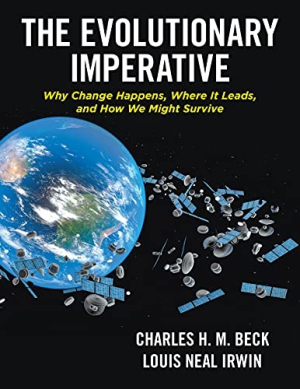The Evolutionary Imperative
With scientific aplomb, The Evolutionary Imperative considers the past and future of humanity.
Charles H. M. Beck and Louis Neal Irwin theorize about the origins and endpoint of evolution in their science book The Evolutionary Imperative.
The book’s overarching contention is that everything—including the stars, mountains, brain evolution, and the development of language—is governed by the same basic laws of nature: to consume and disperse as much energy as possible, as completely as possible. Figuring out how and why such change happens is the goal of Beck and Irwin’s “energy dissipation model of evolutionary imperative.”
The book delivers a thorough explanation of how this imperative has different implications in different circumstances. Rivers, it notes, find the easiest route downhill, altering landscapes to create even more direct routes; and early humans began cooking their food as a way to digest more nutrients faster than their competitors. In this regard, the book says, Homo sapiens is by far the most successful organism to ever evolve. However, the book also notes that humanity’s capacity for energy consumption has started to outstrip the planet’s ability to regenerate depleted energy sources and sustain life. Thus, the book’s final chapter applies Beck and Irwin’s theory to matters of consequence to everyday people: the worsening climate crisis.
This text is persuasive in arguing that human beings should turn their energy-transforming abilities to information dissemination, rather than to the destructive production and procurement of material goods. Otherwise, it says, people will be forced to make more abrupt and difficult adjustments as resources grow scarcer. But this unique way of considering climate change is treated only insofar as it is a natural conclusion of the book’s energy dissipation model; it is not the book’s primary focus.
Though this is a scientific text, there is beauty in its treatment of how everything is connected. Even the book itself becomes part of something larger. Beck and Irwin devote their final chapter to encouraging other researchers to test, add to, or even refute their theories.
The prose is sophisticated and often relies on technical and scientific terminology, requiring a certain amount of concentration. This undermines the book’s stated goal of making these theories more accessible to lay readers. Prior knowledge of biology is helpful. However, while individual scientific terms remain opaque, the book’s general ideas are clear enough, though questionable terminology is used when mentioning disabled people.
The science book The Evolutionary Imperative shows how humans became the world’s greatest energy consumers—and asserts that turning focus to information dissemination is critical for humanity’s survival.
Reviewed by
Eileen Gonzalez
Disclosure: This article is not an endorsement, but a review. The publisher of this book provided free copies of the book and paid a small fee to have their book reviewed by a professional reviewer. Foreword Reviews and Clarion Reviews make no guarantee that the publisher will receive a positive review. Foreword Magazine, Inc. is disclosing this in accordance with the Federal Trade Commission’s 16 CFR, Part 255.

